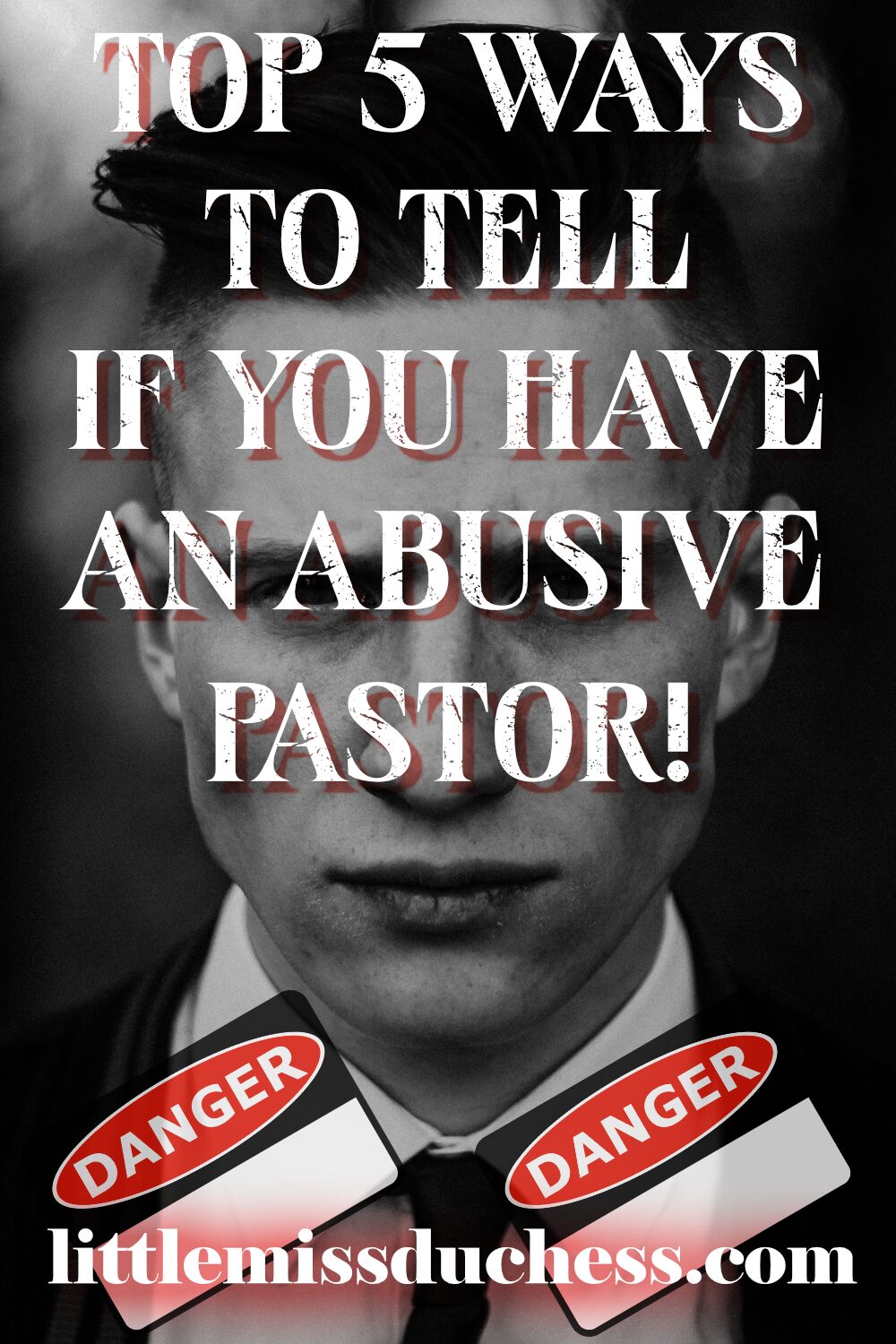
Best 5 Ways to Identify an Abusive Pastor: Recognizing Narcissism and Manipulation in Ministry
Table of Contents
Let’s examine the top 5 ways to identify an abusive pastor. To begin, a pastor’s role is to shepherd their congregation with compassion, wisdom, and humility. However, not all pastors lead with these qualities. Some abuse their position of trust, causing significant harm to their congregation members. This abuse can take many forms—spiritual manipulation, emotional domination, financial exploitation, and more—and is often rooted in narcissistic tendencies or even narcissistic personality disorder (NPD).
Understanding the signs of an abusive pastor is vital for protecting yourself and others in your faith community.
This blog will explore five key signs of pastoral abuse, how these behaviors impact congregations, and the role narcissism often plays in abusive ministry leadership.
1. Ways to Identify an Abusive Pastor – They Demand Absolute Loyalty and Obedience
One of the hallmarks of an abusive pastor is an unhealthy obsession with loyalty. While loyalty to a leader is natural, abusive pastors take this to an extreme, expecting unquestioning obedience to their directives, even when those directives contradict scripture, logic, or morality.
They may misuse scripture to assert their authority, twisting verses such as “Touch not mine anointed” (1 Chronicles 16:22) to silence criticism or dissent. Congregation members who question their decisions or voice concerns are often labeled rebellious, divisive, or even sinful.
This type of control creates a toxic culture where fear replaces faith, and members feel compelled to prioritize the pastor’s approval over their own convictions. In these environments, spiritual growth stagnates, as individuals are discouraged from thinking critically or developing a personal relationship with God independent of the pastor’s oversight.
Narcissistic Root: Narcissistic pastors thrive on control and admiration. They view challenges to their authority as personal attacks, and their need for dominance overrides their responsibility to serve.
2. Ways to Identify an Abusive Pastor – They Exploit Vulnerabilities for Personal Gain
An abusive pastor often targets the vulnerable, such as those going through financial hardship, emotional crises, or spiritual doubt. Instead of offering genuine help, they exploit these vulnerabilities for personal benefit.
For example, they might pressure members into giving beyond their means, claiming it’s an act of faith that God will reward. Financial abuse in the form of constant tithing demands, guilt-tripping over donations, or lavish spending on personal luxuries while the congregation struggles is a common tactic.
On a personal level, abusive pastors might manipulate private confessions shared during counseling sessions, using sensitive information to maintain control or exact revenge.
Narcissistic Root: Narcissistic individuals are skilled manipulators who exploit others to satisfy their own needs, whether it’s financial enrichment, emotional validation, or social power.
3. Ways to Identify an Abusive Pastor – They Show a Lack of Empathy
Empathy is a cornerstone of effective pastoral care, yet abusive pastors are often dismissive of the struggles and feelings of their congregants. They may downplay personal suffering, accuse members of lacking faith, or redirect conversations to focus on themselves.
For instance, if a member shares a personal loss or challenge, the pastor might trivialize the issue or shift the conversation to their own experiences. This lack of empathy erodes trust and leaves members feeling isolated and invalidated in their spiritual journey.
Narcissistic Root: Narcissists lack genuine empathy. While they may feign concern to maintain their image, their true focus is on their own needs and desires, not the well-being of others.
4. Ways to Identify an Abusive Pastor – They Create a Cult of Personality
Abusive pastors often cultivate a personality-centered ministry rather than one centered on Christ. This is evident in how they present themselves as indispensable to the church, claiming that the congregation’s success hinges on their leadership.
They may encourage excessive adoration from members, insisting on being addressed by grandiose titles like “Apostle,” “Prophet,” or “Man/Woman of God.” In extreme cases, they position themselves as the ultimate authority on all spiritual matters, implying their interpretations are infallible.
This cult of personality discourages accountability. Members become so enamored with the pastor’s charisma or perceived spiritual gifts that they overlook or excuse harmful behaviors.
Narcissistic Root: Narcissistic pastors crave admiration and often position themselves as the central figure in the church. Their sense of superiority drives them to demand constant affirmation and loyalty from others.
5. Ways to Identify an Abusive Pastor – They Punish Those Who Challenge Them
In healthy churches, disagreement is handled with grace, understanding, and open dialogue. However, abusive pastors retaliate against anyone who challenges their authority.
This punishment can take many forms, including public shaming, exclusion from church activities, or even outright expulsion from the congregation. They may gossip about dissenters, turning other members against them to isolate and silence criticism.
This creates a climate of fear, where members are too intimidated to speak up, even when they witness abuse. Over time, this stifles accountability and enables the pastor to continue their harmful behavior unchecked.
Narcissistic Root: Narcissists cannot tolerate criticism, as it threatens their inflated sense of self-worth. They react with anger, manipulation, or ostracism to maintain control and protect their ego.

Understanding Narcissism in Ministry
Narcissistic personality disorder (NPD) is characterized by traits such as an inflated sense of self-importance, a lack of empathy, and a deep need for admiration. While not every abusive pastor has NPD, many display narcissistic tendencies that align closely with the disorder.
Ministry can be particularly attractive to narcissistic individuals for several reasons:
- Position of Power: Pastors are often afforded significant authority and influence within their congregations.
- Adoration from Followers: The role comes with built-in opportunities for public recognition and admiration.
- Lack of Accountability: Many churches lack systems to hold leaders accountable, making it easier for narcissistic traits to go unchecked.
- Spiritual Manipulation: Narcissists can exploit religious teachings to justify their behavior and silence criticism.
It’s important to note that narcissistic tendencies exist on a spectrum. Some pastors may exhibit mild traits without being abusive, while others meet the full clinical criteria for NPD and are actively harmful.
How to Protect Yourself and Your Community
If you suspect your pastor is abusive, here are steps to take:
- Educate Yourself: Learn more about spiritual abuse and narcissism to better understand the behaviors you’re witnessing.
- Seek Outside Counsel: Talk to trusted friends, counselors, or spiritual leaders outside your immediate church community for perspective.
- Document Instances of Abuse: Keep a record of concerning behaviors, especially if they involve financial exploitation or emotional manipulation.
- Establish Boundaries: Limit your interactions with the abusive pastor and protect your emotional and spiritual health.
- Consider Leaving: If the abuse is ongoing and unaddressed, it may be necessary to leave the church for your well-being.
Conclusion
An abusive pastor can cause immense damage, but recognizing the warning signs is the first step toward healing and change. By understanding the tactics abusive pastors use and the narcissistic tendencies that often underpin their behavior, congregations can protect themselves and foster healthier, more Christ-centered communities.
If you or someone you know is experiencing spiritual abuse, remember that seeking help is not an act of rebellion—it’s an act of courage and self-preservation. No one should endure harm under the guise of faith, and no leader is above accountability.

